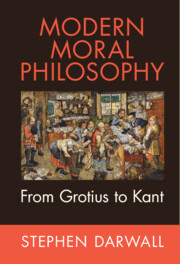
-
Select format
-
- Publisher:
- Cambridge University Press
- Publication date:
- June 2023
- June 2023
- ISBN:
- 9781139025065
- 9780521860475
- 9780521677790
- Dimensions:
- (229 x 152 mm)
- Weight & Pages:
- 0.69kg, 400 Pages
- Dimensions:
- (229 x 152 mm)
- Weight & Pages:
- 0.59kg, 400 Pages
- Subjects:
- Ethics, Philosophy
Book description
In this magisterial study, one of our leading moral philosophers refutes the charge (originally made by Elizabeth Anscombe) that modern ethics is incoherent because it essentially depends on theological and religious assumptions that it cannot acknowledge. Stephen Darwall's panoramic picture starts with the seventeenth-century thinker Grotius and tells the story continuously down to the time of Kant, exploring what was in fact a completely new way of doing ethics based on secular ideas of human psychology and universal accountability. He shows that thinkers from Grotius to Kant are profoundly united by this modern approach, and that it helped them to create a theory of natural human rights that remains of great political relevance today. He further shows that this new way of thinking provides conceptual resources that are far from exhausted, and that moral philosophy in this idiom still has a vibrant future.
Reviews
‘Modern moral philosophy emerged from its medieval and ancient ancestors through the development of new ideas about natural law. Stephen Darwall, in this masterly work, explains the development of these ideas and how they became central to the debates of the eighteenth century over the nature of morality and the sources of moral knowledge. His explanation is a powerful argument for the juridical conception of morality that took form in the work of Grotius and reached its most profound exposition in the work of Kant.'
John Deigh - University of Texas, Austin
Contents
Metrics
Altmetric attention score
Full text views
Full text views help Loading metrics...
Loading metrics...
* Views captured on Cambridge Core between #date#. This data will be updated every 24 hours.
Usage data cannot currently be displayed.
Accessibility standard: Unknown
Why this information is here
This section outlines the accessibility features of this content - including support for screen readers, full keyboard navigation and high-contrast display options. This may not be relevant for you.
Accessibility Information
Accessibility compliance for the PDF of this book is currently unknown and may be updated in the future.


